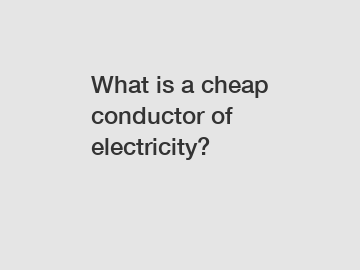What is a cheap conductor of electricity?
What is a cheap conductor of electricity?
Electricity is an integral part of our daily lives, powering our homes, industries, and technological devices. Conductors, substances that allow the flow of electric current, play a crucial role in transmitting this electrical energy. While various materials can conduct electricity, some are more cost-effective than others. In this article, we will explore the concept of a cheap conductor of electricity, examining affordable options and their properties.
1. Copper - The Preferred Conductor:

Copper, renowned for its excellent electrical conductivity, is widely considered the preferred conductor for most applications. It possesses remarkable properties that make it ideal for electrical wiring and transmission. Copper is highly conductive, resistant to corrosion, and versatile, making it suitable for both indoor and outdoor settings. Despite its efficiency, copper's high cost can be a deterrent when considering affordable conductors.
2. Aluminum - A Cost-Effective Alternative:
As an alternative to copper, aluminum has gained popularity in certain applications due to its lower cost. Aluminum possesses around 61% conductivity compared to copper while being significantly lighter. This property makes it an attractive choice for overhead power lines. However, aluminum is more prone to corrosion and has a higher resistance, resulting in energy loss. To mitigate these drawbacks, larger aluminum conductors are required to compensate for higher resistance, offsetting some of its initial cost advantages.
3. Steel - Suitable for Specific Uses:
While steel is not as conductive as copper or aluminum, it is commonly used in applications where conductivity takes a backseat to other properties such as strength and durability. Steel is often utilized in situations where electrical grounding is necessary, ensuring safety by diverting excessive electrical energy into the ground. Despite its lower conductivity, steel is also employed in some overhead transmission lines, providing structural support alongside aluminum or other conductive materials.
4. Graphite - A Surprising Conductor:
Among non-metallic materials, graphite stands out as an interesting conductor of electricity. Composed of carbon atoms arranged in specific patterns, graphite exhibits a unique structure that allows electric current to flow. This property makes graphite suitable for various applications, including electronic devices, electrochemical cells, and lubricants. Moreover, graphite is relatively inexpensive compared to metal conductors.
5. Conductive Polymers - A Promising Innovation:
In recent years, the development of conductive polymers has shown promise in the field of cheap conductors. These organic compounds exhibit electrical conductivity and can be molded into various shapes, providing flexibility in their applications. Conductive polymers offer advantages such as low cost, lightweight, and ease of processing. While they are not as conductive as traditional metal conductors, ongoing research and advancements in this field may lead to more cost-effective options in the future.
In conclusion, the concept of a cheap conductor of electricity encompasses a range of materials with varying properties. Copper, although highly efficient, can be cost-prohibitive in certain situations. Aluminum offers a more affordable alternative, particularly for overhead power lines, while steel is employed in specific cases where conductivity is of secondary importance. Graphite, a surprising conductor among non-metallic substances, presents an inexpensive option with unique properties. Additionally, the emerging field of conductive polymers holds promise for the development of cost-effective electrical conductors. By understanding the characteristics and applications of these materials, we can make informed decisions regarding the most suitable and affordable conductors for specific electrical needs.
Are you interested in learning more about cvc cloth, custom silver plated yarns company, emf material? Contact us today to secure an expert consultation!


